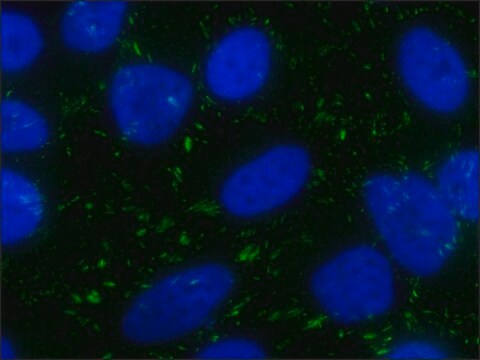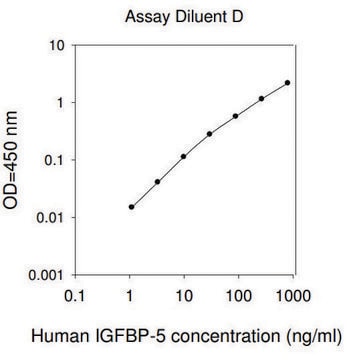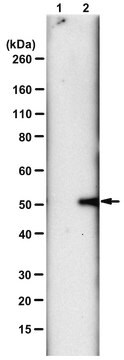General description
We are committed to bringing you greener alternative products, which adhere to one or more of The 12 Principles of Green Chemistry.This antibody is Preservative-free, produced without the harm or sacrifice of animals and exceptionally stable to allow for ambient shipping and storage if needed and thus aligns with "Waste Prevention", "Designing Safer Chemicals" and "Design for Energy Efficiency".
Click here for more information.
ZooMAb antibodies represent an entirely new generation of recombinant monoclonal antibodies.
Each ZooMAb antibody is manufactured using our proprietary recombinant expression system, purified to homogeneity, and precisely dispensed to produce robust and highly reproducible lot-to-lot consistency. Only top-performing clones are released for use by researchers. Each antibody is validated for high specificity and affinity across multiple applications, including its most commonly used application. ZooMAb antibodies are reliably available and ready to ship when you need them.
Learn more about ZooMAb here.Specificity
Clone 3H5 is a ZooMAb rabbit recombinant monoclonal antibody that specifically detects human Pancreatic Polypeptide.
Immunogen
KLH-conjugated linear peptide corresponding to full-length human Pancreatic Polypeptide (without the signal and propeptides).
Application
Anti-Pancreatic Polypeptide, clone 3H5 ZooMAb, Cat. No. ZRB939, is a recombinant Rabbit Monoclonal Antibody that detects pancreatic polypeptide and has been tested for use in Immunocytochemistry, Immunohistochemistry (Paraffin), Immunofluorescence, and Western Blotting.
Immunofluorescence Analysis: A 1:400 dilution from a representative lot detected Pancreatic Polypeptide in human pancreas tissue sections.
Immunohistochemistry (Paraffin) Analysis: A 1:400 dilution from a representative lot detected Pancreatic Polypeptide in human pancreas tissue sections.
Immunocytochemistry Analysis: A 1:100 dilution from a representative lot detected Pancreatic Polypeptide in TGP52 cell line.
Target description
Pancreatic polypeptide (UniProt: P01298; also known as PP, Obinepitide, Pancreatic prohormone) is encoded by the PPY (also known as PNP) gene (Gene ID: 5539) in human. Pancreatic polypeptide is a member of the neuropeptide Y family and is secreted protein that is produced by PP cells in the pancreatic islets of Langerhans. The pancreatic prohormone is synthesized with a signal peptide (aa 1-29) and a propeptide (aa 89-95) that are subsequently cleaved off. The remaining part is cleaved off into pancreatic hormone (aa 30-65) and pancreatic icosapeptide (69-88). Pancreatic hormone acts as a regulator of pancreatic and gastrointestinal functions. Two isoforms of pancreatic polypeptide have been described that are generated by alternative splicing. Pancreatic polypeptide release is functionally associated with increased satiety, delayed gastric emptying, inhibition of gallbladder motility, and regulation of energy expenditure. Its deficiency is observed in cases of pancreatic resection and chronic pancreatitis and is associated with significant reduction in PP cell mass and abnormally high hepatic glucose production even in the presence of endogenous insulin. This ZooMAb recombinant monoclonal antibody, generated by our propriety technology, offers significantly enhanced specificity, affinity, reproducibility, and stability over conventional monoclonals. (Ref.: Maxwell, J et al. (2014). Pancreas 43(4); 651-656).
Physical form
Purified recombinant rabbit monoclonal antibody IgG, lyophilized in PBS with 5% Trehalose, normal appearance a coarse or translucent resin. Contains no biocide or preservatives, such as azide, or any animal by-products. Larger pack sizes provided as multiples of 25 μL.
Reconstitution
120 μg/mL after reconstitution at 25 μL. Please refer to guidance on suggested starting dilutions and/or titers per application and sample type.
Storage and Stability
Recommend storage of lyophilized product at 2-8°C; Before reconstitution, micro-centrifuge vials briefly to spin down material to bottom of the vial; Reconstitute each vial by adding 25 μL of filtered lab grade water or PBS; Reconstituted antibodies can be stored at 2-8°C, or -20°C for long term storage. Avoid repeated freeze-thaws.
Legal Information
ZooMAb is a registered trademark of Merck KGaA, Darmstadt, Germany
Disclaimer
Unless otherwise stated in our catalog or other company documentation accompanying the product(s), our products are intended for research use only and are not to be used for any other purpose, which includes but is not limited to, unauthorized commercial uses, in vitro diagnostic uses, ex vivo or in vivo therapeutic uses or any type of consumption or application to humans or animals.







